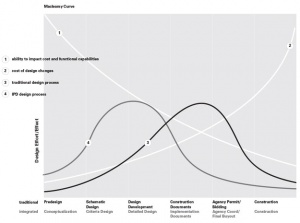License Requirements: Difference between revisions
Jump to navigation
Jump to search
No edit summary |
No edit summary |
||
| (2 intermediate revisions by the same user not shown) | |||
| Line 2: | Line 2: | ||
*Typical is college, internship, and Architect Registration Exam (ARE). Most states requires Bachelor's in Architecture. | *Typical is college, internship, and Architect Registration Exam (ARE). Most states requires Bachelor's in Architecture. | ||
*Advantages - architecture can produce aesthetic and well-functioning design. | *Advantages - architecture can produce aesthetic and well-functioning design. | ||
*OSE perspective - Architecture is good, but it's a silo. An architect does not learn how to build buildings, and is thus not well qualified to produce buildable designs - specifically - designs that are easy to build. | *OSE perspective - Architecture is good, but it's a silo. An architect does not learn how to build buildings, and is thus not well qualified to produce buildable designs - specifically - designs that are easy to build. It is well known in the architecture community until modern times that the architect and contractor fight each other. | ||
*Design-Build is more in line with OSE methods. [https://architizer.com/blog/practice/tools/young-architect-guide-design-build/#:~:text=The%20architect%20usually%20starts%20their,site%20and%20build%20the%20building.]. This | *Design-Build is more in line with OSE methods. [https://architizer.com/blog/practice/tools/young-architect-guide-design-build/#:~:text=The%20architect%20usually%20starts%20their,site%20and%20build%20the%20building.]. This link shows the architect leading the design-build. There is no a-priori reason, however, outside of hierarchism, why an architect should have priority over the builder. An architect should have builder skills. A builder should have architecture skills. Indeed, the optimal route is that both are included in one. The distinction between designers and buidlers can be erased with the empowered, integrated Designer-Builder. This is the approach that OSE takes. | ||
*Integrated Project Delivery - current trend introduced by the AIA in 2007 - [https://architizer.com/blog/practice/tools/young-architect-guide-integrated-project-delivery/]: (click to enlarge) | *Integrated Project Delivery (IPD)- current trend introduced by the AIA in 2007 - [https://architizer.com/blog/practice/tools/young-architect-guide-integrated-project-delivery/]: (click to enlarge) | ||
*OSE/OBI model transcends IPD by combining the designer and builder into one entity by open source rapid learning. Further, the OSE/OBI model integrates engineering into the equation, imposing certain engineering requirements that include specific ergonomic, design-for-buildability, design-for-workflow, materials, and other considerations. Primarily, those considerations revolve around flexibility, swarmability, distributed economies, and scalability of the structure and of the design/build process. | |||
[[File:ipd.jpg|300px]] | [[File:ipd.jpg|300px]] | ||
*[[BIM]] facilitates the IPD process, as everyone gains access to the same digital model. No shit, Sherlock! | |||
Latest revision as of 22:44, 8 November 2020
Architect
- Typical is college, internship, and Architect Registration Exam (ARE). Most states requires Bachelor's in Architecture.
- Advantages - architecture can produce aesthetic and well-functioning design.
- OSE perspective - Architecture is good, but it's a silo. An architect does not learn how to build buildings, and is thus not well qualified to produce buildable designs - specifically - designs that are easy to build. It is well known in the architecture community until modern times that the architect and contractor fight each other.
- Design-Build is more in line with OSE methods. [1]. This link shows the architect leading the design-build. There is no a-priori reason, however, outside of hierarchism, why an architect should have priority over the builder. An architect should have builder skills. A builder should have architecture skills. Indeed, the optimal route is that both are included in one. The distinction between designers and buidlers can be erased with the empowered, integrated Designer-Builder. This is the approach that OSE takes.
- Integrated Project Delivery (IPD)- current trend introduced by the AIA in 2007 - [2]: (click to enlarge)
- OSE/OBI model transcends IPD by combining the designer and builder into one entity by open source rapid learning. Further, the OSE/OBI model integrates engineering into the equation, imposing certain engineering requirements that include specific ergonomic, design-for-buildability, design-for-workflow, materials, and other considerations. Primarily, those considerations revolve around flexibility, swarmability, distributed economies, and scalability of the structure and of the design/build process.
- BIM facilitates the IPD process, as everyone gains access to the same digital model. No shit, Sherlock!
